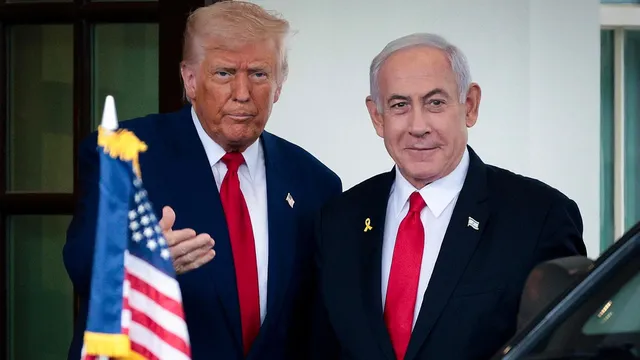
Netanyahu seeks ceasefire progress in Washington meeting with Trump
2025-07-07 11:00- Israel is sending negotiators to Qatar to engage in ceasefire discussions with Hamas.
- The humanitarian crisis in Gaza has led to a significant increase in casualties amid ongoing military operations.
- The meeting between Netanyahu and Trump highlights the urgency for a potential ceasefire in the context of rising hostilities.
Express your sentiment!
Insights
On July 6, 2025, Israeli Prime Minister Benjamin Netanyahu traveled to Washington amid escalating tensions in Gaza. This visit included negotiations with U.S. President Donald Trump regarding a ceasefire between Israel and Hamas, in the backdrop of a 21-month-long conflict that has resulted in significant loss of life. Prior to the trip, Netanyahu emphasized Israel's steadfast military campaign focused on dismantling Hamas's infrastructure, stating that the return of Israeli hostages was a national priority. Approximately 6,860 Palestinians have lost their lives since the ceasefire collapsed in March 2025, showcasing the dire humanitarian crisis in the region. Negotiations had resumed to discuss Trump’s proposed 60-day ceasefire, which aims to address various concerns for both parties. While Hamas is seeking guarantees for a permanent end to hostilities, Israel remains firm that it cannot include Hamas in governance. The dire situation in Gaza, with reports of severe humanitarian needs, has put pressure on both parties to reach a resolution. Hamas, currently under pressure from the Israeli military, has faced considerable losses, leading officials to reconsider their stance on negotiations. This high-stakes meeting reflects the shifting dynamics of regional politics, emphasizing the U.S.'s role as a mediator. Netanyahu's leadership during this period is crucial, as Israel's ongoing military actions and the humanitarian toll raise urgent questions about future peace initiatives. The outcome of these discussions may determine not only the immediate future of Gaza but also broader Middle Eastern relations. As the parties enter negotiations, complexities abound, including divergent demands from Hamas regarding the cessation of hostilities and guarantees against Israeli military operations. Amidst despair, Netanyahu's administration continues to advocate for a solution that ultimately seeks long-term security for Israel while addressing the humanitarian crisis affecting Palestinians in Gaza.
Contexts
The current status of ceasefire talks between Israel and Hamas remains a crucial issue in the ongoing conflict that has persisted for several decades. The complex dynamics of these negotiations have been influenced by various factors, including regional politics, international interventions, and the humanitarian situation on the ground. As of July 2025, diplomatic efforts by different stakeholders, including Egypt and Qatar, have continued in attempts to mediate a sustainable ceasefire agreement. However, the lack of trust between the parties, coupled with ongoing violence, poses significant challenges to achieving a lasting resolution. In recent months, there have been intermittent escalations of violence, which tend to derail negotiations. Each party presents conditions that are often seen as unattainable by the other side. Israel usually demands the complete disarmament of Hamas, while Hamas seeks the lifting of the blockade imposed on Gaza and recognition of Palestinian statehood. The cycle of violence and retaliatory strikes complicates the negotiation process, making it difficult for mediators to establish a conducive environment for dialogue. Additionally, internal divisions within Palestinian factions and varying international responses further contribute to the volatility of the situation. The international community, including the United Nations and various non-governmental organizations, has expressed ongoing concern regarding the humanitarian conditions faced by civilians in Gaza and Israel. Continued hostilities result in significant loss of life, injuries, and displacement, which exacerbate the humanitarian crisis. Ceasefire talks are often accompanied by calls for a humanitarian pause to allow for the delivery of aid and medical assistance. These calls underscore the urgent need for a resolution to the conflict to ensure the well-being of civilians affected by the violence. In summary, while there are ongoing efforts to facilitate ceasefire talks between Israel and Hamas, substantial obstacles remain that hinder progress toward a peaceful resolution. The interplay between diplomatic negotiations, the on-the-ground reality of violence, and the human toll of the conflict continues to shape the prospects for a ceasefire. The need for concerted efforts from regional and global stakeholders is vital to navigating these complexities and ultimately achieving a sustainable peace in the region.